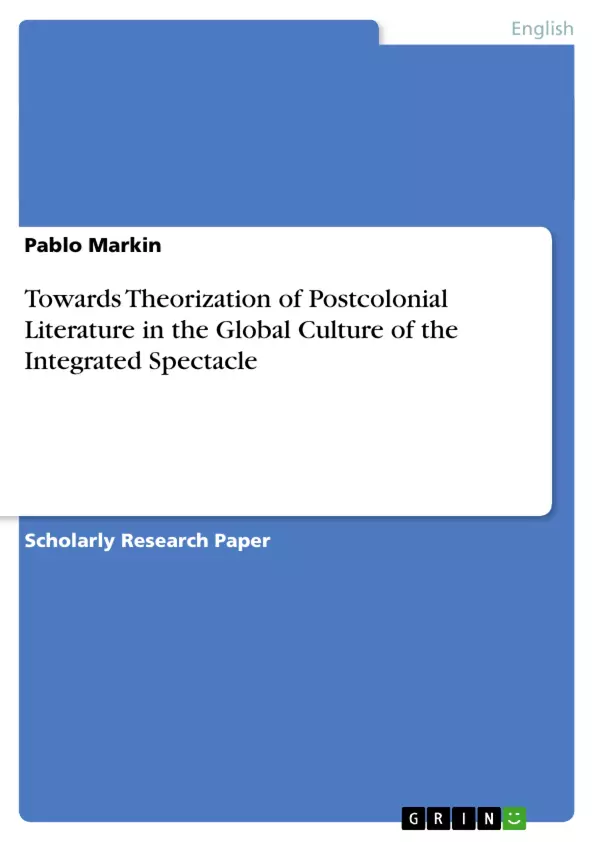In an attempt "to construct what John Hinkson calls a "social theory of postmodernity" that is adequately global (Hinkson 1990)" (Appadurai 1996), I propose to bring the theorization of postcolonial literature to bear on the treatise on The Society of the Spectacle by Guy Debord (1994). To forge the connection between two such disparate texts I take recourse to Arjun Appadurai’s book Modernity at Large: Cultural Dimensions of Globalization (1996) that in important respects touches both on literature as cultural practice and on the global moment in which Debord’s society of integrated spectacle is situated. Debord’s notion of the society of integrated spectacle defines the specificity of the global moment of modernity where “the interlinked diasporas of people and images” (Appadurai 1996) play increasingly decisive role. The postcolonial literature that is intricately connected to multiple landscapes of flow explores their effect upon “the work of the imagination” (Appadurai 1996) as collective social fact. Equally constitutive of the "[d]iasporic public spheres, diverse among themselves” (Appadurai 1996), these flow-scapes produce in the global culture of the society of the spectacle multiple arenas “for conscious choice, justification, and representation” (Appadurai 1996).
Inhaltsverzeichnis (Table of Contents)
- Abstract
- Introduction
- Postcolonial Literature in the Global Moment
- Postcolonial Literature in the Society of the Spectacle
- Postcolonial Literature in the Global Culture
- Conclusion
Zielsetzung und Themenschwerpunkte (Objectives and Key Themes)
This paper aims to integrate the theorization of postcolonial literature with Guy Debord's concept of the society of the spectacle, utilizing Arjun Appadurai's work on globalization as a bridge. The analysis seeks to understand the role of postcolonial literature within the globalized context of modernity and the spectacle.
- The relationship between postcolonial literature and the global moment of modernity.
- The role of postcolonial literature within Debord's society of the spectacle.
- The concept of imagined communities and their formation within postcolonial contexts.
- The interplay between literature and the work of imagination as a collective social fact.
- Postcolonial literature's assertion of difference from the imperial center.
Zusammenfassung der Kapitel (Chapter Summaries)
Abstract: Briefly introduces the paper's central argument: connecting postcolonial literature with Debord's concept of the spectacle through Appadurai's work on globalization.
Introduction: Establishes the paper's framework by outlining the integration of postcolonial literature into the analysis of modernity and the spectacle. It highlights the tension between lived experiences of modernity and theoretical accounts thereof.
Postcolonial Literature in the Global Moment: This section defines "post-colonial" and discusses the global reach of the imperial process, emphasizing the role of literature in shaping imagined communities and asserting agency against colonial centers. It explores literature's role in the appropriation of the Enlightenment project.
Postcolonial Literature in the Society of the Spectacle: [This section is not provided in the excerpt.]
Postcolonial Literature in the Global Culture: [This section is not provided in the excerpt.]
Schlüsselwörter (Keywords)
Postcolonial literature, society of the spectacle, globalization, imagined communities, modernity, imperial process, agency, cultural practice, work of imagination.
Frequently Asked Questions
How does postcolonial literature relate to the "Society of the Spectacle"?
The paper connects postcolonial texts with Guy Debord's theory to show how global images and "flow-scapes" influence the collective imagination in modern culture.
What role does Arjun Appadurai play in this theorization?
Appadurai's work on globalization serves as a bridge, linking cultural practices like literature to the global moment of the integrated spectacle.
What are "imagined communities" in a postcolonial context?
They are social groups formed through literature and media that assert cultural difference and agency against imperial centers.
What is the "work of imagination" as a social fact?
It refers to how collective imagination, fueled by global flows of people and images, becomes a basis for conscious choice and representation in society.
What is the "integrated spectacle"?
A concept by Guy Debord defining a stage of modernity where life is dominated by an interconnected web of images and representations.
- Quote paper
- Dr Pablo Markin (Author), 2006, Towards Theorization of Postcolonial Literature in the Global Culture of the Integrated Spectacle, Munich, GRIN Verlag, https://www.grin.com/document/120886



